Herbs Useful in Stress and Anxiety
By Dr.Suchetha Hedge | Aug 09, 2022
Relation between Health and Stress
Health is a state of balance where the functions of all the systems in the body both physical and mental are in equilibrium. This condition of homeostasis brings in a stability in the living organism characterised by normal body temperature, hormone balance and physical and chemical activity in the body. However in the wake of stressful situations in life, the release of cortisol hormone hampers the fine balance and gives way to ill health. Excess of cortisol in the body and the continuation of being in such situations will not only bring down the body’s defence mechanism and immune system but also affect the functioning of various vital organs in the body.
Ayurvedic herbs in management of stress
Ayurveda believes in keeping the vital bio-energies or the doshas in balance for the healthy state of body. According to this concept all the herbo-mineral drugs used as tridosha shamaka can be used for the management of stress induced ailments. These naturally occurring plants help in removing the toxic effect of the stress induced hormones in the body. Out of innumerable collections of herbs most common ones are Ashwagandha, Shatavari, Shankhapushpi, Mandukaparni, Brahmi, Tulsi, Aparajita, guduchi, etc. All of these herbs work on “Manovaha Strotas” and are mentioned in samhitas having the properties which benefit the mental health. They are revered as Rasayana or Medya drugs.
Adaptogens
Adaptogens are herbs which help in stabilisation of physiological processes and promotion of homeostasis. They contain substances that decrease the sensitivity to stressors through natural ways and help in normalising the body functions. Many herbs from different parts of the world are considered to have adaptogenic effects. For example, ginseng, the most popular Chinese herb, is used widely as an adaptogen. Some researchers claim that these have neuroprotective, anti-fatigue, antidepressant , nootropic and CNS-stimulating activity. Their activity is linked to the Hypothalamic-Pituitary-Adrenal axis and key mediators of stress response such as cortisol and other chemicals in the body.
Some of the Ayurvedic herbs which are easily available in raw forms and can be included in our everyday lives as powders, decoctions, drinks or as plain food could hold the key to the fine balance of doshas and check the effect of stress on our body.
Ashwagandha
Withania Somnifera
It is a nervine tonic and is used in Ayurveda as Rasayana(rejuvenator) and Balya(promotes strength). It is classically used in people with depleted tissues, weak, emancipated, elderly and children with need for nourishment. Ashwagandha is considered as Medya and Smrithivardhaka (improves memory and intellect). Studies have proved its efficacy in relieving stress, anxiety, depression and promoting mental health. It is widely accepted as an herb to treat insomnia. It is a natural antioxidant and hence improves body strength and immunity. Research has proven its usefulness as an excellent immunomodulator.
Roots of Ashwagandha are used in powder form for medicinal purposes. 5g of root powder is advised with milk, warm water, honey, ghee for consuming orally. Decoction or herbal tea can be included in your everyday diet.
According to Ayurveda it has hot potency, pungent and bitter taste and balances all doshas. Many formulations such as ashwagandharishta, avaleha, and tailam are available and used in different conditions. IT is also a key ingredient in Manasamitra vatakam, Brahmi vati used widely in the treatment of adrenal fatigue. Milk processed in ashwagandha root powder known as ksheerapak is an excellent rejuvenator for both young and as well as elderly.
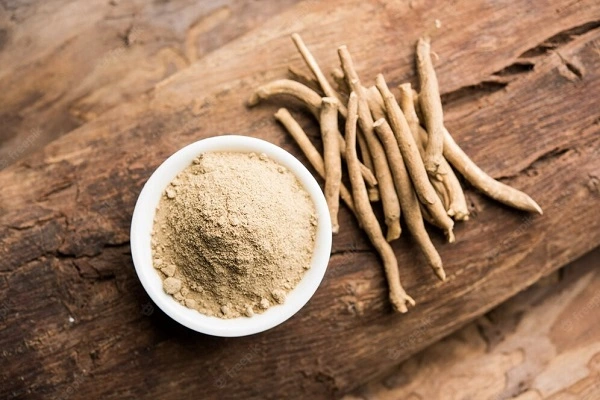
Brahmi
Bacopa monnieri
One of the ancient herbs mentioned in ayurvedic texts such as Charaka samhita for balancing mental faculties. It is included under Medya Rasayana, considered as a brain tonic. This perennial succulent plant contains powerful alkaloids such as brahmin, bacopaside, narcoside and others which affect brain activity. Brahmi is used in promotion of brain cell regeneration and has a definitive effect on Alzheimer’s disease. It rejuvenates the mind, enhances memory and concentration. It is most effective in bringing anxiety and hyperactivity of the brain under control. It has a calming effect on the body and mind. It is specifically used in insomnia and other serious neurological disorders.
According to Ayurveda it has vata-kapha pacifying properties. It is also an antioxidant that helps in flushing out free radicals in the body. As a herb all parts of the plant are used. It can be taken as fresh juice, dried powder or as extract in the form of tablets and capsules. Many classical formulations such as Brahmi Ghrita, Brahmi Tailam are available for usage.
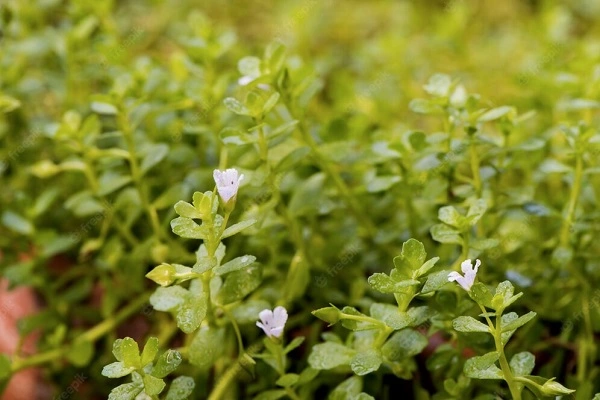
Shankhapushpi
Convolvulus pluricaulis
Shankhapushpi is a potent memory booster and brain tonic. It is a perennial herb that grows as widely across the North Indian plains. Roots of this herb are used for medicinal purposes. The active constituents including alkaloids like Convolvuline, Shankahpushpine have a positive effect on the nervous system and brain. It improves the cognitive functioning of the brain by enhancing memory, reasoning, concentration and focus. It has the ability to reduce mental fatigue. Shankhapushpi is studied well for its effect on depression and anxiety. It is shown that it can balance the neurotransmitters by increasing the secretion of dopamine which inturn controls the effect of serotonin on the mind and body. It provides good relief from symptoms such as cold hands and feet, restlessness, uneasiness and palpitations. It also enhances cardiac functioning by reducing cholesterol in the system.
According to ayurveda it pacifies all the three doshas and is cold in potency. Shankhapushpi is used in various forms such as asava, arista, tablets, powders, oil or tailams. Most popular preparation is shankhpushpi syrup which is available in the market as a tonic.
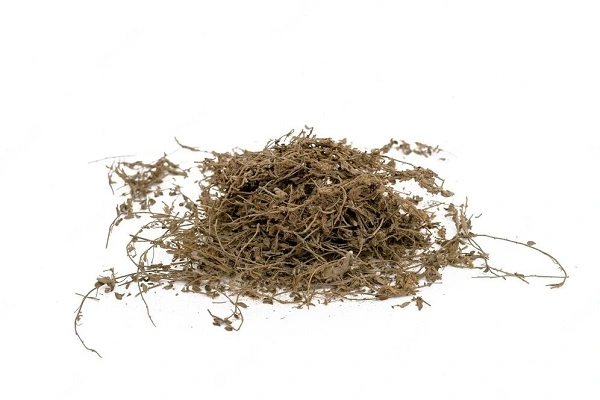
Tulsi
Ocimum sanctum
Known as holy basil, tulsi is sacred to Hindu religion. The leaves of tulsi are well used in households for treatment of cold and cough but the lesser known fact is that it is also a nervine tonic. Acharyas in ayurveda have attributed the quality of tulsi beneficial to mental faculties and have included it in various formulations. Being an aromatic herb it definitely has a calming effect on the mind. It is considered as one of the effective adaptogenic herbs that acts against stress and anxiety and brings in balance.
Tulsi is hot in potency, bitter in taste and normalises kapha and vata dosha. Daily intake of tulsi as a decoction can prevent diseases, promote general health and well-being. These actions can prevent the toxic effect of chemicals in everyday life and prevent cellular damage. Tulsi is well known for its adaptogenic effect by balancing the body and bringing in homeostasis by reducing ill effects of physiological and metabolic stress.
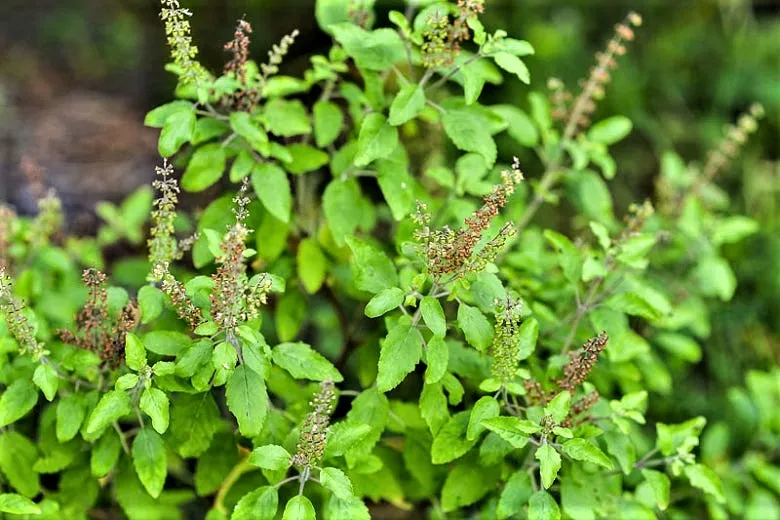
Yastimadhu
Glycyrrhiza glabra
Commonly known as liquorice, it is one of the most commonly used herb roots in ayurveda for a wide variety of ailments, especially respiratory and digestive problems. Mulethi as it is known locally, is a rasayana drug and can be included in our daily diet. It helps control stress hormones, reducing the effects of anxiety and stress in the body. It is also known to have a positive effect in controlling bad cholesterol in the body. Yastimadhu, being classified under jeevaniya gana in charaka samhita , is a herb that promotes longevity of life. It is a beneficial herb in skin and eye care. It can boost immunity and help the body fight against many seasonal ailments. Roots of liquorice have liver protective nature and help in preventing any damage to the organ. According to Ayurveda, it has a vata kapha pacifying quality. It is cold in potency. Root powder is often used in the form of ksheerapak( milk decoction).
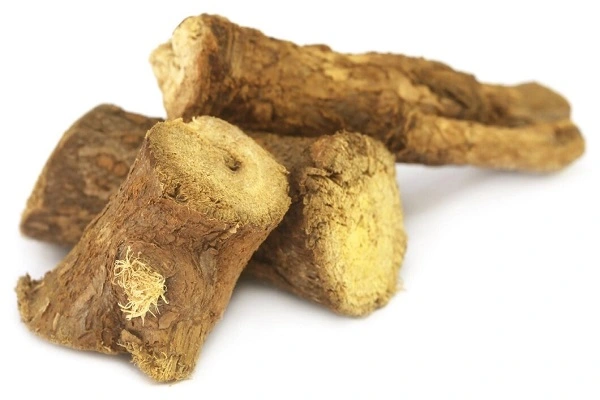
Shatavari
Asparagus racemosus
Shatavari is widely known for its effect as a female tonic. It is considered an adaptogen herb because of its effect on the body and mind. Roots of shatavari have been described in Ayurveda as balya (nutritive), ayushya( longevity of life) and vaya sthapani (delays ageing). It is also a medya- intelligence enhancer. It is an excellent rejuvenating herb and has great neuro-protective action. It is used in many formulations for its nutritive value in ayurveda. It is the drug of choice in case of conditions like tiredness, fatigue, and emancipation which require tissue nourishment. It is a coolant and pacifies all doshas.
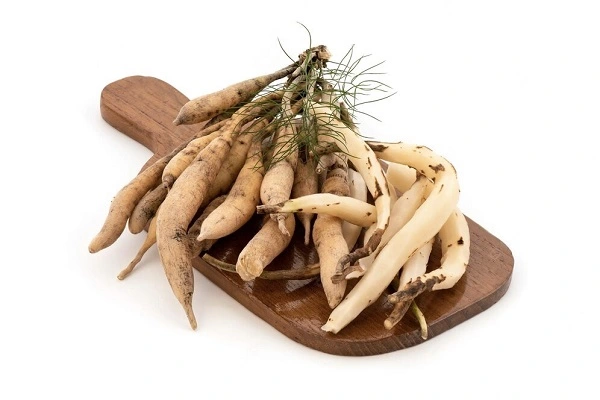
Guduchi
Tinospora cordifolia
Commonly known as Giloy, it is described as a drug which protects the whole body. It is also known as amrita in Sanskrit which means elixir. It contains alkaloids called berberine which are effective in control of diabetes. It has been used in households to cure many conditions like fever, skin ailments, stomach disorders etc. It has a definitive effect on the improvement of general immunity against common cold and other seasonal ailments. Regular use of guduchi can boost energy and immunity and helps in weight management by improving the metabolism and control of sugar and cholesterol in the body. By pacifying all the three doshas, it is also considered a rasayana or rejuvenator in ayurveda.
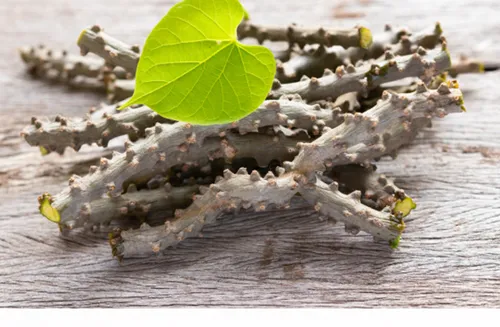
In the treasure of herbs in ayurveda there are innumerable drugs capable of being considered as adaptogens or herbs that can be used to relieve stress and anxiety. Some of the herbs used in classical preparations and also as single herb remedies are as follows-
- Aparajita ( Clitoria ternatea )
- Jatamansi ( Nardostachys jatamansi )
- Jyotishmati ( Celestrus paniculatus )
- Sarpagandha ( Rauwolfia serpentina)
Article By :
Dr. Suchetha Hedge





